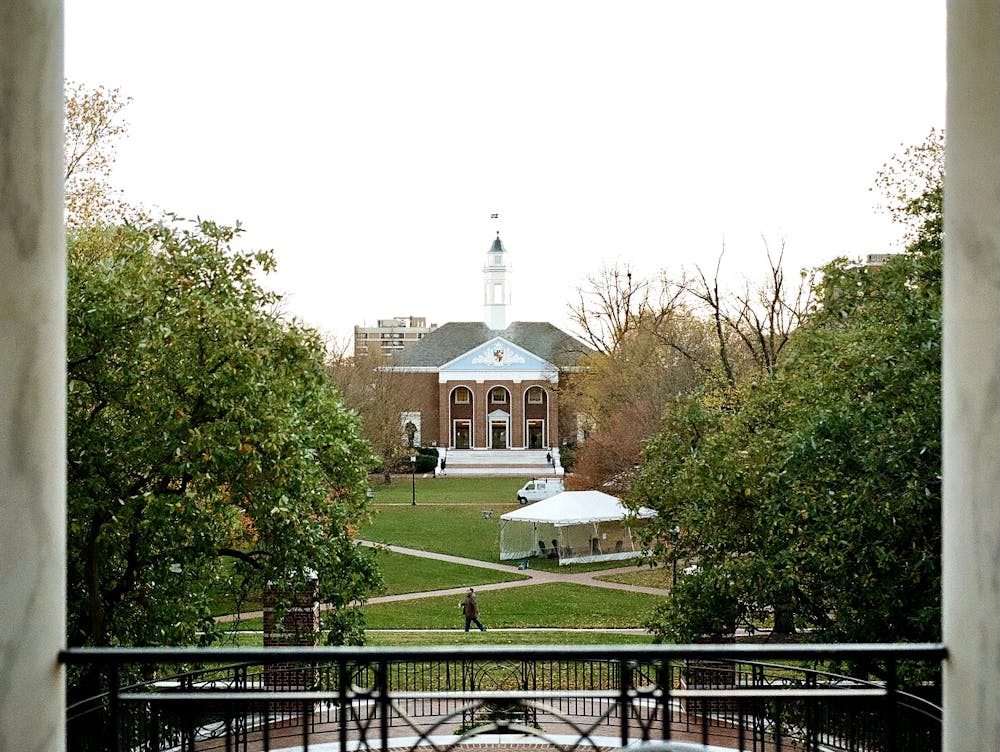Members of Hopkins leadership held a town hall discussing University finances on Nov. 16. The town hall, moderated by Professor of Epidemiology and Executive Vice Provost for Academic Affairs Stephen Gange, centered around the University’s Fiscal Year 2021 (FY21) financial report.
At the town hall, Vice President, Chief Financial Officer and Treasurer Helene Grady shared that the University ended FY21 with a surplus of $213 million, which amounts to a nearly $288 million surplus since the start of COVID-19, and a $3 billion increase in the University’s endowment. After implementing austerity measures in April 2020, University leadership estimated that Hopkins would lose $100 million in FY20 and $375 million in FY21.
The town hall follows criticism by faculty and students that the University was not transparent about its finances and refused to end austerity measures despite its financial surplus.
Alex Parry, a member of the Coordinating Committee of Teachers and Researchers United (TRU), discussed the lack of transparency regarding the increasing endowment and lack of benefits in an email to The News-Letter.
“Despite initially projecting losses of over $475 million for the same period, the university endowment has increased nearly $3 billion,” he wrote. “The administration continues to devise unrealistically conservative financial models to decline to reallocate these gains among faculty, staff and graduate students.”
On April 2, 2021, the University announced that it would end austerity measures, restoring employer retirement contributions, as well as extending $10 million in research funding for Hopkins faculty and $5 million for doctoral students. Parry feels this support was insufficient, pointing to the lack of graduate student representation in University decisions for the inadequacy.
“[The University] has yet to clarify how it will support graduate students, faculty, and staff moving forward,” he wrote. “Until the administration incorporates democratically elected graduate student representatives into every step of the planning and implementation of policies affecting our work conditions, we will continue to have minimal say over our pay and benefits.”
When asked about inflation adjustment for graduate student stipends during the town hall, Provost and Senior Vice President for Academic Affairs Sunil Kumar shared that University leadership has been monitoring inflation and peer institutions in order to support graduate students.
“For students whose doctoral thesis has been affected by COVID[-19], we want to make sure that we have specific interventions tailored to students most affected,” he said. “The schools will do reviews of their graduate student funding, and the University as a whole, in conjunction with the University Pandemic [Academic] Advisory Committee and the [2020 Planning] Student Advisory Committee, will keep funds aside for targeted graduate students in cases of particular need.”
Parry noted the discrepancies in the University’s plan moving forward, specifically when compared to peer institutions.
“TRU recently found that social science and humanities PhD students at Johns Hopkins have the lowest stipends and the third-lowest stipends after adjusting for the local cost-of-living of thirteen ‘peer’ institutions,” he wrote. “The two universities with lower adjusted stipends, furthermore, also offer subsidized housing to their graduate students.”
Parry demanded that the University raise doctoral students’ stipends to at least $35,000, which is the rate at the School of Medicine and the approximate average at peer institutions. He also noted that if the University were to follow Brown University and Yale University in guaranteeing at least six years of funding to doctoral students, the changes would amount to around $10 million per year, which is a fraction of the University’s surplus from FY20 and FY21.
At the town hall, University leadership shared that the current year budgets for FY22 include full restoration of employee retirement benefit contributions, salary increases and normal hiring activity.
Parry expressed the need for the University’s support and investments in the community as the new fiscal year begins.
“The University owes it to its students, faculty and staff to invest its money into its community members through solutions including increased faculty hiring, competitive graduate student stipends tied to the local cost of living, higher wages and improved benefits for staff, dissertation completion fellowships and support for underfunded centers and programs,” he said.





